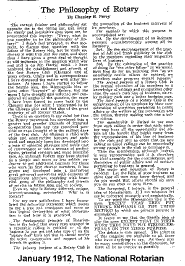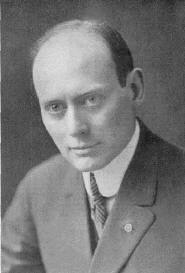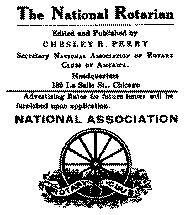|
 The
earnest thinker and philosopher sat opposite me in the dining car, and
fixing his steady and inquisitive eyes upon me, he propounded this
inquiry: “Perry, what do you consider to be the philosophy of Rotary?” I
didn’t feel prepared, at that moment, to discuss that question with the
father of the Rotary idea, but he made me discuss it with him just the
same, and since then I have given a great deal of thought at odd moments
to the question which was and still is on Mr. Harris’ mind. I have
analyzed the establishment and growth of the first Rotary Club (Chicago)
and of many others. Orally and in correspondence I have discussed the
matter with other Rotarians. At times I have started to follow the
Seattle idea, the Minneapolis idea or some other “keynote” of Rotary,
but the more I have thought and reflected and considered all angles of
the question, the more I have been forced to come back to the Chicago
plan (or what I understand to be the Chicago plan and that also of the
great majority of all Rotary Clubs). The
earnest thinker and philosopher sat opposite me in the dining car, and
fixing his steady and inquisitive eyes upon me, he propounded this
inquiry: “Perry, what do you consider to be the philosophy of Rotary?” I
didn’t feel prepared, at that moment, to discuss that question with the
father of the Rotary idea, but he made me discuss it with him just the
same, and since then I have given a great deal of thought at odd moments
to the question which was and still is on Mr. Harris’ mind. I have
analyzed the establishment and growth of the first Rotary Club (Chicago)
and of many others. Orally and in correspondence I have discussed the
matter with other Rotarians. At times I have started to follow the
Seattle idea, the Minneapolis idea or some other “keynote” of Rotary,
but the more I have thought and reflected and considered all angles of
the question, the more I have been forced to come back to the Chicago
plan (or what I understand to be the Chicago plan and that also of the
great majority of all Rotary Clubs).
There is no question in my mind but that the Rotary
movement has developed into a greater and grander example of fraternal
co-operation than any one conceived possible or even thought of in the
earliest days of the first club. As Ofttimes a child with plain and
unattractive features and awkward and ungainly form has developed into a
man of splendid physique and noble cast of countenance or into a woman
of perfect figure, graceful carriage and most beautiful face, so,
although Rotary may have started as a simple and more or less selfish endeavor to get
additional business for those who were its first charter members, it has
grown and developed into a marvelous great universal movement with
elements of magnificent altruism, sparkling with beautiful gems of the
philosophy and science of service to fellow man and to society.
Even so, why is Rotary different, unique,
interest-arousing, successful? Why is it Rotary?
For my own satisfaction I have formulated the following
statement which seems to me a true and consistent and more or less
logical declaration of what Rotarianism is and how it is practiced.
The fundamental principle of
Rotarianism is the belief that every man engaged in a reputable calling
is entitled to all the business he can get and take care of on the
“square deal” basis and that he should receive the active co-operation
and support of his friends in getting it.
The primary purpose of a Rotary Club is the promotion
of the business interests of its members.
The methods by which this purpose is accomplished are:
-
1st. By the development of an intimate personal
acquaintanceship among all its members.
-
2nd. By the encouragement of the practice of full and
frank publicity in the club by the members regarding their respective
lines of business.
-
3rd. By the cultivation of the practice of doing for “the
other fellow” as we would have him do for us, believing that “as we
unselfishly enable others to succeed, we ourselves make progress toward
success.”
|
-
The third purpose of a Rotary
Club is the enlightenment of its members by their consideration of
questions pertaining to public affairs or the welfare of the community
and the nation, thereby making, each one a better citizen.
Thus the membership, although limited, is very
representative and it is therefore an ideal assembly for the
consideration and discussion of public affairs and of matters pertaining
to business in general.
The motto and injunction of Rotary is twofold:
-
Let the
light of your business so shine that all men may know thereof, and
-
As
you would that others should do unto you do you even so unto them.
The foregoing, I believe, is the general idea of
Rotarianism. If I am mistaken let me be corrected promptly and
emphatically.
To my mind the
Minneapolis idea is the same
EXCEPT THAT
THEY PUT STRONG EMPHASIS ON THE THIRD METHOD by which the primary
purpose is accomplished.
It seems to me that the
Seattle idea is
also the same EXCEPT THAT IN THEIR WORK THEY
HAVE PUT STRONG EMPHASIS ON THE THIRD PURPOSE.
The debate is now opened. The columns of this magazine
are available to all those who have anything to say. As there may be
many contributions to the discussion, let them all he as concise as
possible.
Researched by Dr. Wolfgang Ziegler
See our complete section on
Perry |



